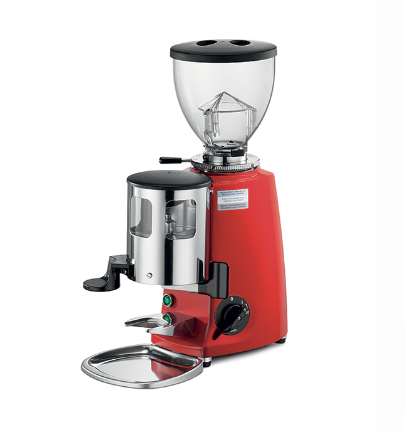Industrial Coffee Grinder Overview: Increase Effectiveness and Top Quality
In the competitive landscape of coffee manufacturing, selecting the appropriate industrial coffee grinder plays a critical duty in enhancing both effectiveness and item quality. Recognizing the nuances of different mill types and key functions-- such as customizable grind settings and durable construction-- can dramatically influence the final taste account of the coffee. The optimization of the grinding process, coupled with thorough upkeep, is necessary for sustaining efficiency over time. As we explore these essential aspects, it comes to be obvious that the ramifications extend beyond mere devices option, impacting general organization success in means that warrant closer evaluation.
Understanding Grinder Kinds
When choosing an industrial coffee mill, comprehending the various kinds available is vital for maximizing both taste removal and operational performance. The two key types of mills are blade grinders and burr mills.

Inevitably, selecting the right kind of grinder is essential to keeping top quality and effectiveness in coffee manufacturing, making it critical for companies to spend in high-quality burr mills for ideal outcomes.
Secret Features to Think About
Picking an industrial coffee grinder needs mindful consideration of several crucial attributes that can considerably influence both efficiency and the total coffee experience. Among the primary aspects to assess is the grinding system. Burr mills are usually favored over blade mills, as they provide a consistent grind size, which is vital for optimum removal and taste.
Another essential attribute is the mill's capability. A flexible grinder with multiple setups permits you to customize the grind size to various developing techniques, improving the coffee's flavor account.
The construction product additionally contributes in durability and maintenance. Stainless steel parts often supply longevity and are less complicated to cleanse, which is necessary for keeping health standards. Evaluate the mill's noise degree, especially in an active café or production atmosphere, where excessive sound can be disruptive. Spending in a grinder that stabilizes these functions can significantly enhance both functional efficiency and the high quality of the coffee served.
Optimizing Grinding Process
To accomplish the most effective cause coffee prep work, optimizing the grinding procedure is vital. The grind dimension dramatically influences extraction, flavor, and total high quality of the made coffee. Different developing methods need details grind sizes; for circumstances, espresso demands a fine grind, while French press demands a coarse texture. Comprehending the partnership in between grind size and brewing technique is the primary step in optimization.


Additionally, keeping track of the grinding speed can optimize the process. Slower grinding frequently produces less heat, maintaining fragile tastes and fragrances. Alternatively, quicker grinding may produce extreme warm, negatively impacting the coffee's quality.
Upkeep and Treatment Tips
Appropriate maintenance and care of industrial coffee grinders are crucial for ensuring optimal efficiency and long life. Routine cleaning is the foundation of maintenance; deposit build-up can impact taste and grinding performance. It is suggested to clean up the grinder after each usage, cleaning down the exterior and getting rid of any coffee grounds from the burrs.
In addition, check the grinding burrs for wear and tear. Plain burrs can endanger grind uniformity, so they must be replaced as essential. Industrial Coffee Grinder. Regularly calibrating the mill is likewise crucial, as this keeps the preferred work dimension for various developing methods
Lubrication of relocating parts should be done according to the producer's requirements, as this decreases rubbing find more and extends the life of the equipment. It is necessary to utilize food-grade lubricants to make certain security and conformity with health and wellness regulations.
Last but not least, keep the mill in a dry and secure environment to stop corrosion and rust. By sticking to these maintenance and care ideas, operators can improve the efficiency of their industrial coffee mills while guaranteeing premium outcome and expanded functional life.
Roi Analysis
Examining the return on financial investment (ROI) for commercial coffee mills is essential for companies looking for to maximize their coffee manufacturing capacities. A comprehensive ROI analysis assists figure out the economic stability of purchasing high-quality grinders, allowing businesses to weigh the first prices versus prospective gains.
To perform a comprehensive ROI analysis, businesses should consider several key elements. Evaluate the purchase price of the mill, consisting of setup and any necessary alterations to existing framework. Next off, determine operational prices, consisting of energy consumption, upkeep expenditures, and labor efficiency improvements. High-performance grinders often lead to lowered grinding time and boosted throughput, which can substantially enhance performance.
Additionally, take into consideration the effect on item high quality. Industrial Coffee Grinder. Superior mills produce an even more constant work size, which can improve taste profiles and customer satisfaction, ultimately driving sales. By raising the top quality of the last product, services can validate higher rates, resulting in raised profits
Conclusion
In recap, an industrial coffee mill plays an essential role in boosting both effectiveness and item high quality within coffee production. By selecting high-grade burr mills outfitted with important features such as adjustable work setups and resilient building and construction, companies can make sure optimum flavor extraction. Normal upkeep is crucial for sustaining grinder performance and taking full advantage of client contentment. Ultimately, the strategic investment in a reputable grinder contributes dramatically to improved revenue and competitiveness in the coffee industry.
In the affordable landscape of coffee manufacturing, choosing the right commercial coffee mill plays an essential function in enhancing both efficiency and item high quality. The two primary types of mills are blade mills and burr grinders. Within the burr mill category, there are flat burr grinders and cone-shaped burr grinders, each with its benefits. Burr grinders are normally liked over blade mills, as they supply a consistent work size, which is important for optimal extraction and flavor.
In summary, a commercial coffee mill plays an essential role in boosting both more information efficiency and item look these up quality within coffee manufacturing.